Democrats’ Debate Qualification Rules Too Easy to Game
Rich candidates are buying artificial donors to stay in the contest.
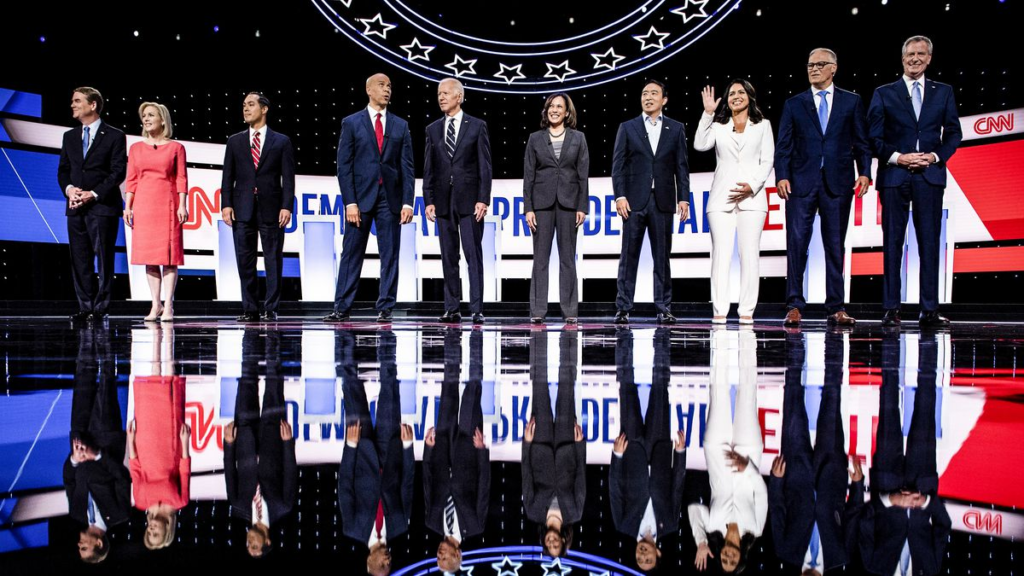
There are too many people who have no business running for President doing so in the Democratic field, to the detriment of candidates who have a legitimate chance of facing off against President Trump. The party should be working aggressively to narrow the debates to viable candidates while simultaneously pushing others to run for winnable Senate seats. Instead, they’re rewarding billionaires and forcing others to spend their resources chasing artificial supporters.
Democratic presidential hopeful Montana Gov. Steve Bullock (D) slammed the Democratic National Committee’s (DNC) debate qualification rules on Tuesday after billionaire Tom Steyer reached the donor threshold for the party’s fall primary debates.
“The DNC donor requirement may have been added with the right intentions, but there’s no doubt that it’s created a situation in which billionaires can buy their way onto the debate stage, and campaigns are forced to spend millions on digital ads chasing one dollar donors — not talking directly to voters,” Bullock said in a statement. His presidential campaign has made a tentpole issue out of working to get big money out of politics.
“We’re kidding ourselves if we’re calling a $10 million purchase of 130,000 donors a demonstration of grassroots support,” he continued.
Steyer’s campaign announced on Tuesday that he had reached the required number of donors needed to qualify for the third and fourth Democratic primary debates.[…]
Candidates must bring in at least 130,000 donors and register at least 2 percent in four surveys from DNC-approved pollsters.
While Steyer only launched his campaign over a month ago, he has acquired donor support through aggressive ad spending on Facebook, Google and cable news.
—The Hill, “Bullock knocks DNC rules after Steyer reaches donor threshold for fall debates“
I certainly don’t feel sorry for Bullock, who’s part of the problem here. He’s a complete unknown outside of Montana and should be running to defeat Republican Steve Gaines to help his party retake that body. Still, he’s right: the notion that Steyer deserves to be on the debate stage more than him because he can buy “supporters” is absurd. (They’re both at 0.5% in the RealClearPolitics average.)
Meanwhile, not only did viewer interest in the debates decline markedly between the first and second round but, as Jennifer Rubin has pointed out, they’ve neither allowed any of the less-known candidates to break through nor shaken up the relative standing of the pre-debate frontrunners.
Granting that polling this far out is more a measure of name recognition than support, it’s nonetheless a much better proxy for viability than the ability to persuade people to donate $1 to a campaign. And, since it’s much, much easier to buy donors than popular support, it virtually requires no-name candidates interesting in continuing their vanity campaign to spend their advertising budgets on social media platforms to gin up “support.”
The voting in Iowa and New Hampshire will be over in six months. Candidates who aren’t a 5% in the polls by now simply aren’t viable. I would use a trusted index rather than random individual polls. Using 5% in the RCP average as the threshold we’d be left with five candidates: Joe Biden (30.8%), Elizabeth Warren (18%), Bernie Sanders (16.8%), Kamala Harris (8.3%), and Pete Buttigieg (6.3%). The next candidate, Beto O’Rourke, is way down at 2%—a massive drop-off.
Two rounds with the fifteen dwarfs is more than enough. Get it down to candidates who have even a remote chance to win the nomination, have substantive discussions that allow all of them to speak in more than sound bytes, and winnow the field to one.

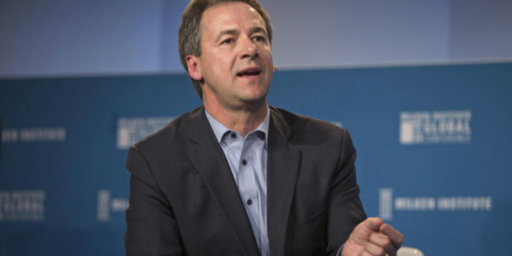
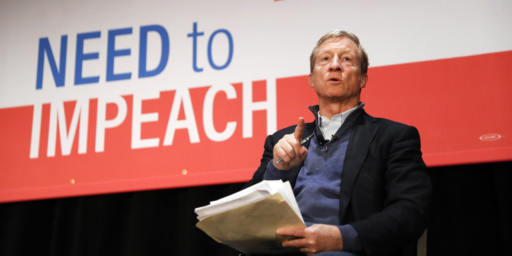
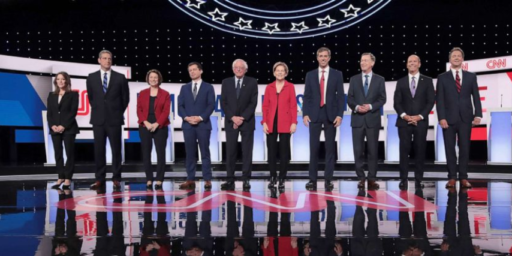
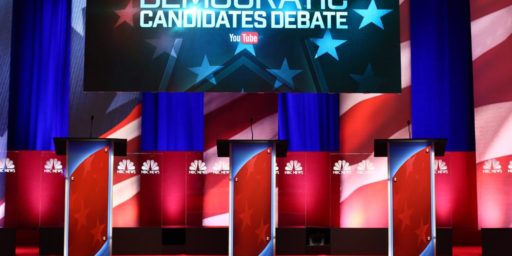
For what it’s worth I think the DNC criteria are better than the RNC criteria from 2016. Perhaps you’re right that the criteria for the 3rd and 4th debate should be stronger, but it seems to me there’s plenty of time for that once we get closer to the start of voting in February.
In the end, though, they’re going to get flack no matter what rules they adopt.
Wait a minute. The reality is that Steyer has *not* qualified for the next debate. He did buy his way into the donor threshold but isn’t close to the 2% threshold in multiple polls (has a single Emerson poll back in July).
Now you may think that a 5% threshold is better than a 2% one right now but the 2% threshold still is limiting it to 9 candidates (Casto, Gabbard and Steyer have the donor requirements but unlikely to get the polling; no one has the polling but not the donors) and the “extra candidates” from your criteria are Beto, Klobuchar, Booker and Yang. All, with the possible exception of Yang, are reasonably serious candidates with national profiles.
Even after the 4th debate in October, we will still be months from the early voting in February and none of this will matter at all. All that will matter will be the early votes in Iowa, NH and maybe NV and SC later than month. Candidates that win or are really close in the early states will thrive and those that don’t will whither.
@SKI:
I think we’ll see some dropouts before February. Running a Presidential campaign, even a shoestring one, isn’t cheap and most of these also-ran candidates did pretty badly in 2nd quarter fundraising. One can only assume it will be worse in the 3rd quarter.
@SKI:
538 has him with 3 of the needed 4 polls as of yesterday. I suspect he’ll somehow manage to qualify. It’s just a silly process.
The DNC already has given everyone an equal chance at a prime national debate. It’s time to split into adult and kiddie debates.
I saw the Steyer ad a bunch of times on YouTube. My reaction was, “who are you?” along with the nope.
Even if he makes it, I don’t think it’s going to matter much. Who knows, maybe he’s going for a personal branding moment.
No, but their egos might be. The DNC is not mandating that anyone buy anything or holding guns to anyone’s head forcing them into the offices of Google or Facebook.
Most governors are complete unknowns outside their state when they start their run. Bullock has time to try to get lightning to strike before considering the Senate.
Just because none of the less known candidates succeeded in breaking out doesn’t mean that they weren’t allowed to.
Harris got a huge boost from the first debate (which has mostly evaporated). There’s no structural reason that Hickenlooper or Delaney couldn’t have gotten a boost — in fact, they had their moments, and were found lacking.
This is getting out of hand. I see Joe Sestak is running for the D nomination. He’s been running since June and I don’t recall seeing his name until yesterday.
I am annoyed that Yang has made the cutoff. I hope that debate moderators specifically Target him with questions where “I’ll give people $1,000/mo” is not an answer.
“Mr. Yang, antibiotic resistance has been a growing problem, raising the costs of healthcare. What would a Yang administration do about it?”
“Mr. Yang, the Trump administration did nothing about the ethnic cleansing and genocide of the Rohinga. Do you agree with that position, and what would a Yang administration do in a similar situation?”
If Steyer or Williamson makes the debate, they should get the same treatment — reasonable questions as far from their area of “expertise” as possible. Maybe Marianne Williamson has something profound to say about the increase in cases of brain eating amoebas, or our declining helium supply. None of them have any business running for President with no elective experience.
I’d be ok with Buttigieg getting a bit of that too, and I think he would rise to the challenge.
I’m sorry, but I’m going to be THAT type of *hole: Steve Daines, not Gaines. 😉
And who is behind this stupid strategy? Tom Perez? It’s insane that they would not try to prop up legitimate contenders, get rid of the riffraff, and maximize their chance to take over the Senate…
The mistake the DNC made was to authorize debates too early in the winnowing process. They would have been much better advised to let the candidates engage in traditional campaigning until November, and then allow the top-polling five to participate in authorized debates and town halls commencing in December (with a rider to include anyone within, say, 1 point of the fifth ranking candidate).